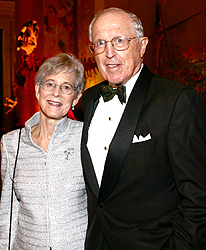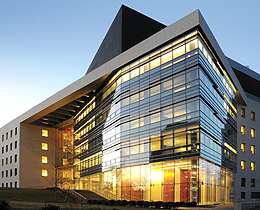

FULL STORY
Einstein Receives $25-Million Gift to Support Stem Cell and Epigenomic Research and Clinical Skills Training
The Albert Einstein College of Medicine of Yeshiva University announced today that it has received a major gift of $25 million — one of the largest in the College's 53-year history — from Ruth L. and David S. Gottesman.
 The Gottesman gift will support several important research projects at the College of Medicine, most of them to be conducted in the new Michael F. Price Center for Genetic and Translational Medicine/Harold and Muriel Block Research Pavilion, which officially opens in June 2008. The Price Center/Block Research Pavilion is the largest medical research facility to be constructed in the Bronx since Einstein opened in 1955.
The Gottesman gift will support several important research projects at the College of Medicine, most of them to be conducted in the new Michael F. Price Center for Genetic and Translational Medicine/Harold and Muriel Block Research Pavilion, which officially opens in June 2008. The Price Center/Block Research Pavilion is the largest medical research facility to be constructed in the Bronx since Einstein opened in 1955.
Funds from the gift will be allocated as follows: $15 million will be used to establish the Ruth L. and David S. Gottesman Institute for Stem Cell and Regenerative Medicine Research; $7 million will fund The Center for Epigenomics, to be headed by Einstein researcher Dr. John Greally; and $3 million will be used to create The Ruth L. Gottesman Clinical Skills Facility in the soon-to-be renovated Van Etten Building, which Einstein has leased from Jacobi Medical Center as part of its overall expansion. In addition, the gift will support an endowed chair at the Gottesman stem cell institute and a faculty scholar in Epigenomics, as well as the recruitment of top-flight faculty that will bolster Einstein's already prominent leadership in both of these important fields.
"In discussions with the College, we determined that stem cells, epigenomics and clinical training were areas where we could help make an important contribution, both to Einstein and to the future of biomedical research," said Dr. Ruth Gottesman, who was elected chair of Einstein's Board of Overseers in 2007 and is the first woman, and the first former faculty member, to serve in that role. "We want our gift to support endeavors that will position Albert Einstein College of Medicine to excel in both research and medical education, while also attracting the best and brightest to our laboratories and to our classrooms."
"The Gottesman gift will contribute significantly to Einstein's already formidable research efforts in stem cell/regenerative medicine research and epigenomics," said Allen M. Spiegel, M.D., The Marilyn and Stanley M. Katz Dean at Einstein. "Additionally, the gift will establish an innovative facility to further enhance the training of future generations of physicians at Einstein, helping them master the clinical skills that will prepare them to be first-rate health care providers."
The specific benefits of the gift to Einstein, as well as to the patients who will be helped by the resulting research and training, are as follows:
- Exploring the basic biology of stem cells — discovering, for example, how a human embryonic stem cell develops into a liver cell rather than a brain cell — is crucially important if stem cells are to be used to treat a wide range of devastating human diseases. Einstein researchers are at the forefront of this inquiry, and the Gottesman gift establishing the Institute for Stem Cell and Regenerative Medicine Research will help them achieve their research objectives.
Already, for example, Einstein professor Eric Bouhassira is well on the way to directing human embryonic stem cells to form blood-forming cells (which could save the lives of cancer patients needing transplants of compatible blood-forming cells), and to form adult red blood cells (for people needing blood transfusions). In the area of regenerative medicine, the Einstein Liver Center is conducting pioneering research to cure liver diseases and inherited disorders such as hemophilia by implanting cells that will multiply and restore patients' damaged or diseased organs or tissues.
- With some 20 of its scientists studying epigenomics, Einstein ranks as a leader in this exciting new field, which the National Institutes of Health recently added to research programs it funds that are "expected to have exceptionally high impact." Epigenomics is the study of the vast network of chemical "marks" inside our cells that control the expression of our genes, turning them on and off at certain times and in certain tissues. These chemicals, which latch onto our genes but can also be removed, comprise our "epigenomes" and affect our lives in crucially important ways. Scientists now believe that many complex diseases, such as Alzheimer's and autism, result from epigenomic changes that cause gene regulation to go awry. Altered epigenomic marks have also been found in every type of cancer that researchers have examined.
Dr. Greally, an internationally recognized expert in epigenomics and head of the new Center for Epigenomics at Einstein, has developed a novel method for "mapping" the most important epigenomic marks: the methyl molecules present throughout a person's genome. He has used this method to detect the methylation patterns that characterize breast tumors and other types of cancers. Thanks to the resources that the new epigenomics center offers, Dr. Greally and his colleagues can now devise therapeutic strategies aimed at erasing the epigenomic marks that cause cancer and other diseases.
- A portion of the Gottesman gift will greatly enhance Einstein's efforts to impart clinical skills to its students. Teaching medical students the basic skills of clinical examination — how to communicate with patients and take their histories, for example — is crucially important in training new doctors. Up until now, Einstein has lacked a single, stand-alone clinical center where its medical students could master such skills. When the new facility is built, Einstein will have the state-of-the-art training facility that it needs.
 The $25 million gift is a reflection of the Gottesman's longstanding affiliation with the College of Medicine. In 2002, the couple endowed a professorial chair at Einstein's Children's Evaluation and Rehabilitation Center in connection with Dr. Gottesman's life-long interest in helping people with learning disabilities.
The $25 million gift is a reflection of the Gottesman's longstanding affiliation with the College of Medicine. In 2002, the couple endowed a professorial chair at Einstein's Children's Evaluation and Rehabilitation Center in connection with Dr. Gottesman's life-long interest in helping people with learning disabilities.
Prior to joining the Einstein Board of Overseers in 2002, Dr. Ruth Gottesman had a distinguished 33-year academic career at the medical school, beginning in 1968 when she joined Einstein's Children's Evaluation and Rehabilitation Center (CERC) to develop a program for children with dyslexia and other learning disabilities. She went on to serve as CERC's Director of Psychoeducational Services and later as Director of the Adult Literacy Program. In 1999, she became Founding Director of the Fisher Landau Center for the Treatment of Learning Disabilities, a new division of CERC that was established to provide interdisciplinary services to individuals of all ages with learning disabilities.
David Gottesman is the founder and senior managing director of the First Manhattan Company, an investment advisory firm. He was Chairman of the Board of Yeshiva University from 1990 to 1998.
Posted on: Thursday, May 15, 2008


